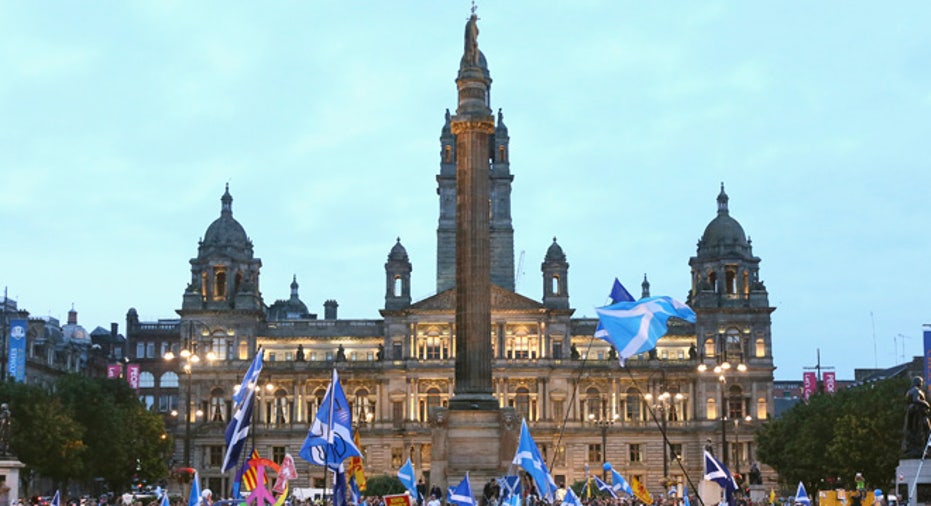Great Scot!! Game NOT Over!!

They’re not getting divorced, but they’re still going to fight. Just because Scots decided to stick with the United Kingdom doesn’t mean all Scots are happy about it. Even though voters rejected a referendum on breaking away from the U.K. by a surprisingly comfortable margin of 55% to 45%, that still means close to half of Scottish voters aren’t too happy with the arrangement.
And that’s exactly what this vote has produced – an arrangement. More to the point, it’s a financial understanding between Scotland and England. And now it’s up to England to deliver on that “understanding.”
That means British Prime Minister David Cameron must make good on promises to allow Scots greater control over tax and spending issues. Talking to quite a few Scottish voters this past week, it’s safe to say they have a very different view of “control” than some Brits do. For example, some who pushed hard for an independent Scotland, only eased up when they surmised London was giving them darn near an independent Scotland.
What if British lawmakers in London come back and argue, “We didn’t mean total spending autonomy.” And what’s to stop angry Scottish lawmakers from saying, “We took you at your word that we would set our tax agenda, not you.”
Let’s just say – not easy, not smooth, not fun. Welcome to the post-near-breakup reality. And not just in Scotland. How do you think all this is going over in fellow United Kingdom countries Wales and Northern Ireland? It stands to reason voters there too will want the same concessions that Scots were granted – maybe more. What will be their reward for standing pat and not putting up a fuss?
Count on just the opposite if Westminster barely gives either a glance. And therein lies the challenge, and maybe the folly of this deal, and why no less than media mogul Rupert Murdoch argued before the votes were tallied in Scotland, that life in the United Kingdom will never be the same. Not only is Cameron still on a very short leash with voters who think he botched the handling of this Scottish revolt, Murdoch explained, but the rest of the world has been put on notice that rebellion is still very much in the air.
“It’s very interesting,” Murdoch told me. “I think there’s meaning in this. I think this goes beyond Scotland. I think there’s a great sort of anti-establishment groundswell, which is seen in this vote in Scotland. You’re seeing it down here in Britain in the anti-European party in one single issue, which is to get out of Europe. And I think you’re seeing it in France with the polling for Jean-Marie Le Pen (a former National Front party leader).”
And not just in Europe, Murdoch said. This throw-the-bums-out or just “chew-them-out” sentiment is going viral. “You can take the United States and go across to Middle America,” he explained. “What do they think in Washington, and Wall Street for that matter? They’re literally looking for change.”
If true, Scotland and England have their respective work cut out for them, and keeping an increasingly fraying United Kingdom could prove a 24/7 nightmare for whatever government is in charge in London. Not just because of the promises made to keep Scots happy, but to keep a lot of them in line when it turns out what they thought they were getting they are not, so likely very “unhappy.”
Scotland was just the latest dust-up. But it won’t be the last. The problem, to Murdoch’s point, is the growing chasm across the globe between the economically well-off and those who feel increasingly ticked off – not sharing in what they’re told is a worldwide recovery – but a recovery that doesn’t appear to be benefitting them.
Angry Scottish independent voters who were still licking their wounds, relayed to me how eager they are to try another referendum in 16 years, the soonest they can – regardless of whether Cameron delivers on his promises. As one Edinburgh resident put it, “I just don’t think we can ever be fully Scottish when they (Britain) are so much in control of our lives.”
He clearly speaks for a disgruntled minority of voters who didn’t get their way, but that’s still a lot of voters. Further, his views reflect the sentiment of a lot of those “NO” voters as well – the ones who voted against Scotland bolting from the United Kingdom because the prospect of the unknown was so scary. It’s not just a coincidence that polls started widening in the “No” camp’s favor after Scottish voters were pounded with dire warnings of what life would be like without mother England -- doom-and-gloom scenarios of a Scotland left defenseless without Britain’s military support, and financially vulnerable without her Majesty’s pension and health services support.
Perhaps Art Laffer said it best when this former Ronald Reagan and Margaret Thatcher adviser told me that fear-mongering can only get you so far. “What keeps a people happy and engaged,” he explained “is when they’re in an environment that engages them and empowers them.” Put another way – when they’re the ones calling the shots, not the government.
If Scots ultimately stuck with the safety of staying in the United Kingdom over the fear of what might happen if they left the United Kingdom, market watchers say that’s hardly reassuring, or lasting. “The wounds that fester leading up to a divorce don’t just disappear when a couple avoids a divorce,” said one London money manager.
And he should know. I’ve kept his name out…because his wife…is Scottish.



















